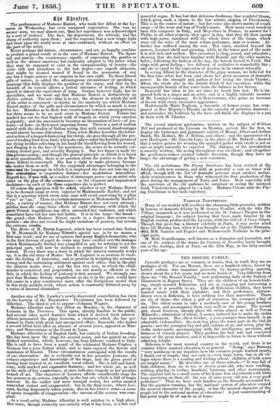Another star of Mr. Lumley's newly-discovered constellation has risen on
the horizon of the Haymarket. Piccolomini has been followed by Albertini. The third is yet to appear—Johanna Wagner.
Madame Albertini made her debut on Monday, in the character of Leonora in the Treratore. This opera, already familiar to the public, had several other novel features from which it derived fresh interest: Alboni personated the gipsy Azucena, a character which she has per- formed in Paris with great and unexpected effect; Baucarde who makes a second debit here after an absence of several years, appeared as Mau- rice; and Beneventano as the Count de Luna.
Madame Albertini is of English birth, but entirely of Italian breeding. She has been upon the stage for several years, and has gained an esta- blished reputation, which, however, has been hitherto confined to Italy. She is said to have been a pupil of the celebrated Madame Ungher, a German but a pure Italian artist, and to have enjoyed the favour and assistance of Rossini. These circumstances correspond with the results of our observation : she is evidently not in her premiere jeunesae, she evinces experience and knowledge of the stage, and she gives proof of having been trained in an excellent vocal school. She is tall and hand- some, with marked and expressive features ; and her whole air, as well as the style of her countenance, at once indicates tragedy as her peculiar branch of art. The character of Leonora affords considerable scope for her powers as an actress, especially in the last act, which is full of tragic interest. In the earlier and more tranquil scenes her action seemed somewhat violent and exaggerated; but in the final scene, where Leo- nora, having desperately taken poison, dies in her lover's arms—a scene of agony incapable of exaggeration—the success of the actress was com- plete. .
As a vocal artist, Madame Albertini is well entitled to a high place. Her voice, though evidently not entirely what it has been, is a fine and powerful organ. It has lost that delicious freshness, that youthful bloom, which gives such a charm to the less artistic singing of Piceolomini. This is in the course of nature ; but her voice also shows marks of rough usage—of the wear and tear of Verdi's music. How many vocal murders have this composer in Italy, and Meyerbeer in France, to answer for! Unlike in all other respects, they agree in this, that they fill their operas with high notes, sustained with the whole force of the lungs, which wear out the voice of the most robust performer, man or woman. Al- bertini has suffered among the rest. Her voice, strained beyond its powers, becomes shrill and piercing, while in the lower part of the scale it is still rich and mellow. Her execution is clear, round, and articulate ; showing that she had been familiar with Rossini and the older masters, before, following the fashion of the day, she betook herself to Verdi. She sings with great feeling ; her delivery of recitative is remarkably fine ; and she is equal to the expression of passion in its utmost intensity. In seeing Alboni in the character of the gipsy woman, we believed for the first time what has been said about her great accession of dramatic power. In the strength and pathos of her acting she rivals Viardot ; whom she rivals also in the artistic finish of her execution, while the incomparable beauty of her voice turns the balance in her favour. Baucarde has risen in his art since we heard him last. He is im- proved both as a singer and an actor, and is a highly valuable member of Mr. Lumley's company. So is Beneventano, who gains an increase of favour with every successive appearance. • Mademoiselle Marie Taglioni, a favourite of former years, has reap- peared at Her Majesty's Theatre in the capacity of premiere &miens° ; and astonishes the habitues by the force and finish she displays in a pas de deux with M. Charles.


































 Previous page
Previous page